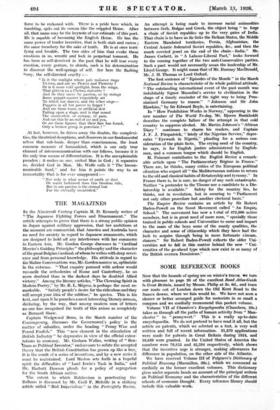THE MAGAZINES
IN the Nineteenth Century Captain M. D. Kennedy writes of
"'The Japanese Fighting Forces and Disarmament." The article attempts to prove that there is a strong public opinion in Japan against military aggression, that her ambitions at the moment are commercial, that America and Australia have na need for anxiety in regard to Japanese armaments, which are designed to hold off any interference with her commerce
in Eastern Asia. Mr. Gordon George discusses in " Cardinal Mercier's Guiding Principles." the philosophy and the character
of the great Belgian Cardinal, of whom he writes with deep rever- ence and from personal knowledge. His attitude in regard to the Maline Conversations was, Mr. Gordon assures us, optimistic in the extreme. " That enquiry pursued with ardour would
reconcile the orthodoxies of Rome and -Canterbury, he no more doubted than in the darkest days he doubted Allied victory." Among the literary articles, " The Clowning Spirit in Modern Poetry," by Mr. R. L. Megroz, is perhaps the most re- markable. " Satisfy people's desire for the ridiculous and they will accept your idea of the sublime," he .quotes. This is his text, and upon it he preaches a most interesting literary sermon., - declaring, by the way, that among modern men of letters no one has recognized the truth of this axiom so completely as Bernard Shaw.
Captain Wedgwood Benn, in the March number of the Contemporary, discusses the Government's policy in the matter of subsidies, under the heading " Penny Wise and Pound Foolish." This " new element in the stimulation of British Industry " he deprecates in view of the official cxhor-;
tations to economy. lir. Graham Wallas, -writing of " Ben-, 4tham as Political Inventor,' endeavours to refute the accepted theory that the British Constitution has grown up like a tree; It is the result of a series of inventions, and by a new series it must be maintained. Lord Meston sets forth in a hopeful spirit the difficulties of " Lord Irwin's Task in India," and Mr. Harbutt Dawson pleads for a policy of segregation for the South African native..
The extent to which Bolshevism is penetrating the Balkans is discussed by Mr. Cecil F. Melville in a striking article called "Red Imperialism " in the Fortnightly Review. An attempt is being made to increase racial animosities between Serb, Bulgar and Greek, the object being " to forge a chain of Soviet republics up to the very gates of India.
That chain is to have as its links the Balkan States, the Middle Eastern Mandated territories, Persia, Afghanistan, the Central Asiatic federated Soviet republics, &c., and then the
much coveted jewel on the end of the chain—India." Mr. James Corbett, in " A Labour-Liberal Pact," looks forward
to the coming together of the two anti-Conservative parties. Such a pact would not necessarily mean the leadership of Mr. Lloyd George. It might mean that of Mr. Ramsay MacDonald, Mr. J. H. Thomas or Lord Oxford.
The first sentence of " Episodes of the Month " in the March National Review is characteristic of its whole political attitude.
" The outstanding international event of the past month was indubitably Signor Mussolini's service to civilization in the shape of a timely reminder of the right way to bring Prus- sianized Germany to reason." " Johnson and Sir John Hawkins," by Sir Edward Boyle, is entertaining.
In " How Prohibition Works in Norway," appearing in the new number of The World To-day, Mr. Bjoern Bunkholdt describes the complete "failure of the attempt in that cold country to suppress alcohol. Mr. Martin Johnson's " African Diary " continues to charm his readers, and Captain J. F. J. Fitzpatrick, " lately of the Nigerian Service," depre- cates " Eyewash in Nigeria," pleading for a serious con- sideration of the plain facts., The crying need of the country, he says, is for English justice administered by English- men, and a common tongue -which should be English.
M. Poincare contributes to the English Review a remark- able article upon " The Parliamentary Regime in France." There are, he thinks, many critics of the European political situation who exped all " the Mediterranean nations to return to the old and classical habits of dictatorship and tyranny." In France there is, he is sure, no danger of any such catastrophe. Neither "a pretender to the Throne nor a candidate to a Dic- tatorship is available." Safety for the country lies, he thinks, not in revolution, but in securing to "- Parliament not only other procedure but another electoral basis."
The Empire Review oontains an article by Sir Robert Baden-Powell on the Scout Movement called " An Empire School." The movement has now a total of 472,860 active members, but is in great need of more men, " specially those trained in public schools and Universities to come and impart to the mass of the boys some of the manly qualities, the ; character and sense of citizenship which they have had the luck to acquire through being in more fortunate circum- stances." Sir Robert Baden-Powell exhorts the older Uni- versities not to fall in this matter behind the new " Uni- versities of the go-ahead type which now exist in so many of the British oversea Dominions."






























































 Previous page
Previous page